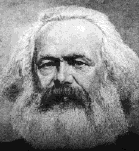 Karl Marx, 1818 - 1883 was a German philosopher and political theorist who is considered the father of Communism.
Karl Marx, 1818 - 1883 was a German philosopher and political theorist who is considered the father of Communism.Marx originally studied law and then philosophy before becoming interested in revolution. He was a journalist and editor for many radical newspapers across Europe, however his revolutionary ideas led to him being forced out of many countries before he settled in London, where he stayed until his death.
Marx believed that his approach to politics was economical and scientific. He thought that you could explain everything by analysing the way economic forces society in social, religious, legal and political processes. Marx's friend and the co-author of The Communist Manifesto Fredrich Engles believed that Marx achieved a fusion of Hegelian philosophy, British Empirical economics and French revolutionary politics, particularly the socialism aspect. Marx himself linked much of his work to that of Charles Darwin, however Darwin himself is said to disputed this.
Many of Marx's theories appear to have been influenced by Hegel, though he dismissed and changed many of Hegel's ideas. The Hegelian theory of the dialectic is clearly the one with which Marx is most concerned with. As I have previously explained http://josh-tyler.blogspot.com/2011/03/georg-wilhelm-friedrich-hegel.html, Hegel felt that change occurred when one idea (the thesis) was contradicted by another (the antithesis) to create a new idea - the synthesis. Marx liked this idea as a way for history to progress, however, whereas Hegel believed that history was guided by a 'geist' spirit towards an absolute end, Marx believed it was more practical and political, dismissing Hegel's idea as idealist nonsense.
Marx saw the real dialectic not as a geist, but in economic life, particularly in class struggle. His theory of history is therefore known as 'Dialectic Materialism'. Indeed in changing Hegel's key philosophy (as well as disagreeing with his love of the state and belief in God) Marx demonstrates his belief in using other ideas as only an outline to create your own: 'the philosophers have only interpreted the world - the point however, is to change it'.
The idea of class struggle is the main driving force of the Communist Manifesto. Marx outlined that society was now separated into two classes; the working Proletariat and the Bourgeois. He believed that though the Bourgeois were in themselves a revolutionary force, they did so solely for capital and greed, turning all professionals into mere paid wage labourers. He criticised globalisation and industrialisation for placing property and ownership into just a few wealthy hands and as a result creating political centralisation of power.
This society, with all its new machinery and processes reduced the lower middle class to working class and as a result united the low paid worker, creating a more unified Proletariat. Marx actually has 'workers of the world, unite' on his tombstone. Marx felt that this was a clear example that capitalist society and the Bourgeois who created it were doomed to fail and were simply 'digging their own graves'. As the Proletariat had nothing to lose and everything to gain, it was they who could act as the antitheses of the dialectic and drive change in, Marx saw this change as socialism and eventually Communism. Marx envisioned this as a society of equality, justice and the fulfilment of a truly free individual.
Marx outlines in The Communist Manifesto ten main policies that the Communist party would enforce;
1. Abolition of Private Property
2. A heavy graduated income tax
3. Abolition of inheritance right
4. Confiscation of rebel and emigrant property
5. Centralisation of banks
6. Centralisation of transport
7. Extension of factories
8. Combine agriculture with manufacture (to establish a more balanced difference between cities and countryside)
9. Equal obligation of all to work
10. Free education for all children and abolition of child labour.
Once this measures were in place Marx believed that class distinctions would disappear and the public would lose its political character. This would mean that the dictatorship of the proletariat (a socialist process that Marx felt was necessary for the laws to be implemented) would become redundant.
After this a free and equal society would prevail, a society where man was not alienated from one another, were we value each other over gain and possessions and behaved From each according to his ability, to each according to his need.
The manifesto ends with a Rousseau inspired slogan to encourage the working class to rise up and end the oppression of the Bourgeois:
Let the ruling classes tremble at a Communist revolution. The proletarians having nothing to lose but their chains.

